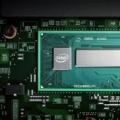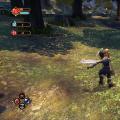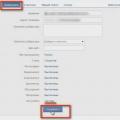Reasons why the hard drive clicks and their solution. Why does the computer click? Computer clicks: it's a hard drive
Clicks can be emitted by both the system speaker and external speakers. At the same time, the system speaker rarely creates problems, but its external counterparts are quite capable of noise “provocations”. If the clicks disappear when the external speakers are disconnected from the device, then the malfunction most likely lies in them.
HDD

Clicks with the same frequency and amplitude can be emitted by a hard drive if its mechanism malfunctions. This can be drive wear, incorrect head parking, disk damage, and so on. If the sounds come from the HDD, then it is urgent to look for ways to save information, because the end time of such a hard drive is absolutely unpredictable.
Power Supply
Clicks in the power supply, accompanied by a malfunction of the system, require its immediate examination. Otherwise, there is a high probability of destroying not only the installed OS, but also the computer as a whole. In the absence of proper experience, self-repair of this unit is categorically not recommended. And the main reason is its subsequent safety, because soldering just one wire in the wrong place can lead to a short circuit, the consequences of which can be the inoperability of the PC, and, even worse, a fire in the room.
Coolers
Coolers can also make active noise. Noises appear when an imbalance occurs, the lubricant dries out, damage to the blades, clogging with dust, and so on. Having identified the most noisy instance, you can try to lubricate it, unless, of course, there is mechanical damage.
loose wires
Wires disconnected from the factory cables may well cause noise if they touch the cooler blades. Therefore, it is necessary to carefully clean the system unit from dust, and after carrying out such a procedure, always check the integrity of the wire harnesses.
After such a check, broken components should be repaired. It is best to contact a service center specializing in this. If the components cannot be repaired, they must be replaced.
These are the reasons for the occurrence of extraneous noise can be observed on a personal computer. If they are not ignored, then the computer will last longer, and its use will be less expensive.
According to statistics, after about 6 years, every second HDD stops working, but practice shows that after 2-3 years, malfunctions may appear in the operation of the hard disk. One of the common problems is the situation when the drive cracks or even beeps. Even if this was noticed only once, certain measures should be taken to protect against possible data loss.
A working hard drive should not have any extraneous sounds during operation. It makes some noise, resembling a buzz, when information is being written or read. For example, when downloading files, running programs in the background, updating, launching games, applications, etc. There should be no knocks, clicks, squeaks and cod.
If the user observes sounds unusual for the hard drive, it is very important to find out the cause of their occurrence.
Checking the status of the hard drive

Often, a user who runs the HDD health diagnostic utility can hear clicks that the device makes. This is not dangerous, because in this way the drive can simply mark the so-called bad sectors.
If the rest of the time there are no clicks or other sounds, the operating system is stable and the speed of the HDD itself has not dropped, then there is no reason to worry.
Switching to power saving mode

If you have turned on the power saving mode, and when the system goes into it, you hear the clicks of the hard drive, then this is normal. If you turn off the corresponding settings, clicks will no longer appear.

Power outages
Power surges can also cause the hard drive to click, and if the problem is not observed the rest of the time, then everything is in order with the drive. Notebook users may also experience various unusual HDD sounds when running on battery power. If the clicks disappear when the laptop is connected to the network, then the battery may be defective and should be replaced with a new one.
Overheat
For various reasons, the hard drive may overheat, and a sign of this condition will be various non-standard sounds that it makes. How to understand that the disk is overheating? This usually happens under load, for example, during games or long-term recording on the HDD.
In this case, it is necessary to measure the temperature of the drive. This can be done using the HWMonitor or AIDA64 programs.
Other signs of overheating are freezing of programs or the entire OS, a sudden reboot, or a complete shutdown of the PC.
Consider the main causes of high HDD temperature and how to eliminate it:

Servo marking damage

At the production stage, servo marks are recorded on the HDD, which are necessary for synchronizing the rotation of the disks and the correct positioning of the heads. Servo marks are rays that start from the center of the disk itself and are located at the same distance from each other. Each of these labels stores its number, its place in the synchronization chain and other information. This is necessary for the stable rotation of the disk and the accurate determination of its areas.
A servo label is a collection of servo labels, and when it is damaged, some area of the HDD cannot be read. The device will then try to read the information, and this process will be accompanied not only by long delays in the system, but also by a loud knock. In this case, the disk head knocks, which tries to access the damaged servo.
This is a very complex and serious breakdown in which the HDD can work, but not 100%. You can fix the damage only with the help of a servowriter, that is, low-level formatting. Unfortunately, there are no programs for this that offer a real “low level format”. Any such utility can only create the appearance of low-level formatting. The thing is that the formatting itself at a low level is carried out by a special device (servowriter), which applies servo markup. As already clear, no program can perform the same function.
Cable deformation or defective connector

In some cases, the cause of the clicks may be the cable through which the drive is connected. Check its physical integrity - whether it is interrupted, whether both plugs are tightly held. If possible, replace the cable with a new one and check the quality of work.
Also inspect the connectors for dust and debris. If possible, connect the hard drive cable to a different connector on the motherboard.
Wrong position of the hard drive

Sometimes the snag lies just in the wrong installation of the disk. It must be bolted very tightly and must be located exclusively horizontally. If you put the device at an angle or do not fix it, then the head during operation can cling and make sounds like clicks.
By the way, if there are several disks, it is best to mount them at a distance from each other. This will help them to cool better and eliminate the possible appearance of sounds.
physical breakdown

A hard drive is a very fragile device, and it is afraid of any impacts such as falls, shocks, strong shocks, vibrations. This is especially true for laptop owners - mobile computers, due to the negligence of users, more often than stationary ones fall, hit, withstand heavy weights, shaking and other adverse conditions. One day this can lead to drive failure. Usually, in this case, the disk heads break, and their recovery can be performed by a specialist.
Ordinary HDDs that are not subjected to any manipulations can also fail. It is enough for a particle of dust to get inside the device under the writing head, as this can cause creaking or other sounds.
You can determine the problem by the nature of the sounds emitted by the hard drive. Of course, this does not replace a qualified examination and diagnosis, but it can be useful:
- Damage to the HDD head - a few clicks are emitted, after which the device starts to work more slowly. Also, with a certain frequency, sounds that continue for some time may occur;
- The spindle is faulty - the disk starts to start, but in the end this process is interrupted;
- Bad sectors - there may be unreadable areas on the disk (at the physical level, which cannot be eliminated by software methods).
What to do if the clicks cannot be fixed on your own
In some cases, the user cannot not only get rid of clicks, but also diagnose their cause. There are only two options for how to do it:
- Buying a new HDD. If the problematic hard drive is still working, then you can try to clone the system with all user files. In fact, you will only replace the media itself, and all your files and OS will work as before.
If this is not yet possible, you can at least save the most important data to other sources of information storage: USB-flash, cloud storage, external HDD, etc.
- Contacting a specialist. Repairing physical damage to hard drives is very costly and usually does not make sense. Especially when it comes to standard hard drives (installed in a PC at the time of purchase) or bought independently for little money.
However, if there is very important information on the disk, then the specialist will help to “get” it and copy it to a new HDD. With a pronounced problem of clicks and other sounds, it is recommended to contact professionals who can recover data using software and hardware systems. Independent actions can only aggravate the situation and lead to the complete loss of files and documents.
We have analyzed the main problems due to which the hard drive can click. In practice, everything is very individual, and in your case a non-standard problem may arise, for example, a jammed engine.
Finding out for yourself what caused the clicks can be very difficult. If you do not have sufficient knowledge and experience, we advise you to contact specialists or purchase and install a new hard drive yourself.
If you begin to notice that your computer clicks or some kind of shuffling is constantly heard from the side of the system unit, it may be worth paying closer attention to this.
In general, as you understand, a computer device is noisy. For any machine that contains rotating elements makes sounds. And there are dozens of reasons for that. And most of them are objective. However, the sounds of forced air are already familiar to you. And by the way, if the sound gets louder, we are talking about dust-blocked radiators. But if the clicks are distinct, with a high tone?
Computer clicks: it's a speaker
This is easy to check. There are multiple speakers installed in the system. one of them, the system one, is hidden from your eyes. It is either planted on the motherboard and firmly fixed on it, or connected to the computer case through a two-wire wire. It rarely causes problems for the user. Usually it is external speakers that are to blame for the fact that the computer clicks. Disable them. Do not remove it from the socket, but simply remove the jacker from the socket for a moment (moreover, the background sound of the characteristic noise tone at the moment of switching is normal). If the clicks continue, we can talk about problems with the speaker (here it has already been removed):

inside view - somewhere there is a built-in speaker nest
However, this issue should not be closed. Often appearing clicks in the speakers while working with the system with intensive work with the hard drive (and sometimes it's just moving the mouse) indicates a malfunction of the electronic components of the computer. We are talking about the power supply and the motherboard:

trouble with the motherboard - it's coming to an end
For starters, just try to reduce the electrical potential inevitably induced on the computer case. If you live in a modern apartment with a three-wire network, you are in luck: protective grounding along a separate core will remove the leakage potential from drying capacitors from the metal base of the case. Otherwise, you should think about an additional wire from the case; in such rooms, I advise you to solve the problem simply: one end of a piece of wire of small cross section on the computer case (usually from the side of fastening the PSU with screws), I fasten the other to the metal base of a naturally grounded apparatus or part of communications. I look forward to the angry shouts of electricians and fire safety specialists. However. It's worth trying at least to find out why.
In any case, problems with the speakers are solved. Either by switching to another port, or by purchasing a separate audio card. There is an option with USB speakers.
Computer clicks: cable
Sometimes it happens. If the system unit has not been in the hands of the rounder (from rounding - such a pretty design of fixed wire loops inside devices and machines), it is likely that one of the wires, loops or cables touches the blades. The issue is solved by securely fastening the wires inside the system unit:

before rounding...

... and after rounding
Computer clicks: it's a hard drive
A very likely reason. And such clicks are well distinguished. Usually these are sounds of a distinct tone of the same amplitude and at regular intervals. We are talking about a mechanical failure of the moving parts inside the disc mechanism. Regular incorrect head parking, wear of the drive mechanism are the most common causes of HDD failure in the “mechanical part”. Save vital data urgently - their loss is already a matter of time. The situation is often aggravated by the fact that software methods cannot prevent or predict the situation here.
Computer clicks: it's a power supply
You can't confuse the clicks of this device with anything. Loud and extremely perceptible for the system. Accompanied by computer failure. Moreover, the PSU fails both on the system unit itself and on the monitor. And if a CRT monitor lives out its historical milestone on your desk, consider that all mounted electronic components have been working against you for a long time. If the monitor, for example, turns off from time to time with a characteristic click, call the repairman or the store for a new model.

 Solving the most common problems
Solving the most common problems Solving the most common problems
Solving the most common problems How to delete a group in VK (Vkontakte)?
How to delete a group in VK (Vkontakte)?